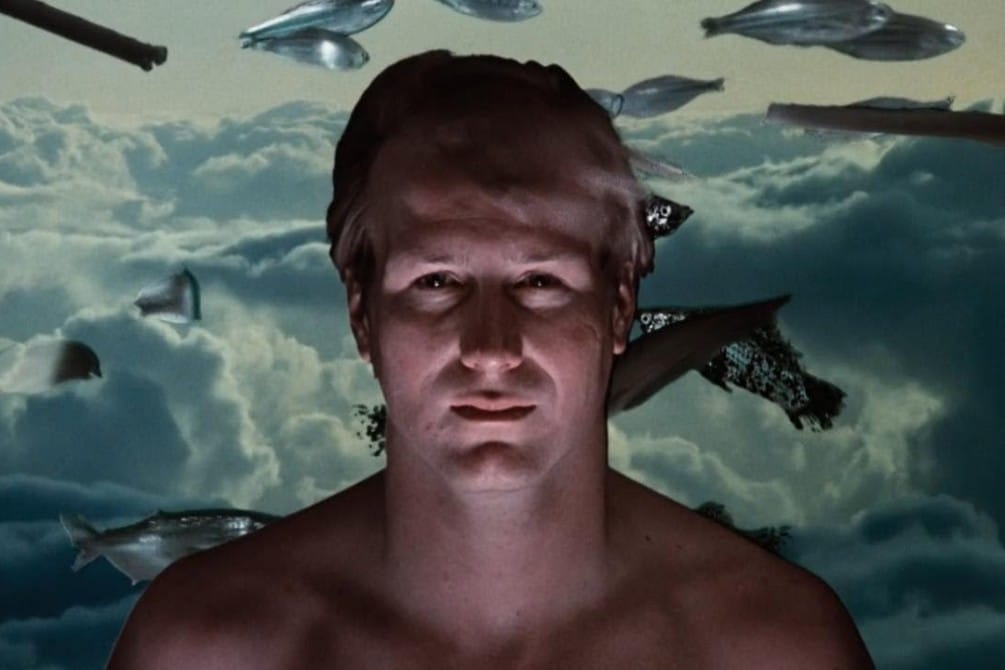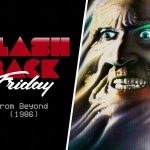“Altered States” is an intense, thought-provoking, and enjoyable viewing experience — a mind-bending dive into psychedelic mysticism.
Altered States is a visually abrasive quest to discover nothing less than the originating spiritual singularity, humankind’s ancestral first thought, tearing the veil off the Real to stare into the face of God (whatever that might be).
Given this over-the-top premise, you might think Altered States would endorse some kind of ‘60s countercultural worldview. However, as the film’s narrative unfolds, the mystical revelation of the Real is exposed as a horrific experience that gnaws away at the things that actually make us human.
In the film’s opening, we’re introduced to Dr. Eddie Jessup, played with absolute surety by Oscar-Winner William Hurt in his feature-film debut.
Jessup uses an aquatic sensory deprivation tank to study alternative states of consciousness, and he becomes convinced that the human mind contains billions of years of evolutionary memory that can be potentially accessed. Eddie is a scientist consumed by this work. He meets a younger graduate student, Emily (played by Blair Brown), and they quickly become lovers.
But even as Eddie and Emily’s relationship blossoms into marriage, there’s a disconnect between them. Emily wants Eddie to accept things that aren’t perfectly stable, like the process of loving another person. Eddie, on the other hand, wants to grab onto a fundamental reality.
In his journey toward mystical revelation, Eddie is accompanied by two other researchers, Arthur (played by Bob Balaban) and Mason (played by Charles Haid). While Arthur is generally more sympathetic to Eddie’s bizarre experiments, Mason is extremely skeptical.
Eddie eventually procures some hallucinogenic drugs from Mexico, which he then consumes before going into the sensory deprivation tank.
And it’s in these scenes of gradually escalating psychedelic insanity that Altered States absolutely shines.
Extremely fast editing, flashing lights, and weird juxtapositions of images make these sequences compelling and disturbing.
One of Eddie’s first hallucinations (before he actually takes the drug) includes a crucified seven-eyed ram, an image clearly inspired by the book of Revelation. And after taking the drug, his hallucinations start to manifest as physical transformations. I won’t spoil exactly how this works in the film, but suffice it to say there are some great moments of body horror here.
While the visuals in Altered States are certainly the main draw, another stunning aspect of the film is its academy-award-nominated score by classical composer John Corigliano.
Corigliano’s music is rich and kaleidoscopic, exploring a huge array of orchestral timbres, harmonies, and rhythms. While not theme-oriented like a John Williams score, the Altered States score still uses short melodic motifs to create connections between scenes. And when the music needs to go crazy, it absolutely does.
During hallucination sequences, Corigliano’s music attacks the audience’s ears with pulsating brass and shrieking strings, perfectly complementing the chaotic imagery onscreen.
Eventually, Eddie finds what he’s looking for, sort of. He regresses back to the origin of life itself, to the beginning of the universe. But instead of finding meaning or God, he finds nothing, a pure void. This existential horror is compounded by the fact that he has taken too much of the drug and now starts regressing even when he’s not in the sensory deprivation tank.
In response to this horror, Altered States tries something that would have come off as silly and trite under almost any other circumstances.
Specifically, Eddie is saved by Emily’s love, the only thing tethering him to the world of human experience, counteracting the ineluctable pull of the void.
But what makes this narratively interesting instead of cheesy is that “love” is explicitly defined in the film as that which is not transcendent or eternal. Eddie has been spending all his time searching for eternality and transcendence, but the transcendent turns out to be horrifying, a glimpse into absolute emptiness. Love, on the other hand, is contingent, risky, unstable, and not guaranteed.
There is no “true love” in Altered States, just the everyday and never-perfect labor of learning to love another person. It is this non-transcendent idea of love that allows Eddie to retain his humanity in the face of the eternal void.
Altered States has the potential to appeal to lots of different types of movie fans.
If you’re a fan of psychedelic horror or body horror, this movie delivers with its grotesque transformation sequences and flashy visuals. If you’re a fan of science fiction, this movie offers an intriguing speculative premise taken to its furthest possible conclusion.
And if you like director Ken Russell’s other movies, such as The Devils (1971) or Crimes of Passion (1984), Altered States presents his trademark dramatic flair with elements of the transgressive.
All in all, it’s a fascinating and highly recommended film.
Altered States (1980), directed by Ken Russell, is available to rent on Amazon Prime and YouTube.


















Follow Us!